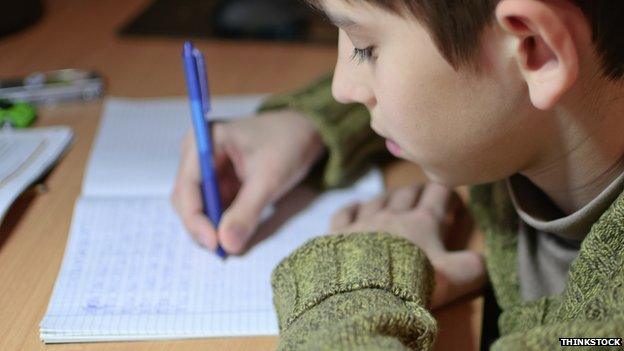Exam focus damaging pupils' mental health, says NUT
- Published

Education should be a joyful experience, says the NUT
Too much focus on exams is damaging pupils' mental health and self-esteem in England's schools, a report says.
The National Union of Teachers' report says pupils are developing stress-related conditions linked to testing.
Based on a survey of 8,000 teachers and a review of research, the report says drilling for tests has narrowed what children are learning.
The government said it is determined to ensure every child is able to realise their potential.
The report, Exam Factories? The Impact of Accountability Measures on Children and Young People, by Prof Merryn Hutchings of London Metropolitan University, says pupils' emotional health and wellbeing is suffering because of "high-stakes testing".
'Complete meltdown'
These are the national tests, exams and progress measures which the government uses to hold schools to account.
Most teachers surveyed for the report agreed pupils became "very stressed/anxious in the time leading up to Sats/public examinations".
One teacher said: "You just see them sat there, a 10- or 11-year-old kid in complete meltdown."
Another said: "I have just had a child off school for three days because he was so worried about his recent test result and didn't want to take any more tests."
Lucie Russell, director of campaigns at mental health charity Young Minds, which backed the report, said: "Both pupils and teachers are under a lot of pressure to achieve results in a pressure cooker, exam factory environment.
"Many of the young people Young Minds works with say that they feel completely defined by their grades and that this is very detrimental to their wellbeing and self-esteem."
According to the report, the tests affect both able and less able pupils similarly.
'High expectations'
One secondary school special-needs co-ordinator said: "The higher ability [pupils], and the ones with the very supportive or pushy parents, are receiving higher levels of stress because of how much is being expected of them.
"I think the lower end or those with maybe less supportive parents as well are suffering from the fact that they are not being given a curriculum that suits them."
The report also argued the focus on testing was harming pupil-teacher relationships, with teachers less able to view pupils in the round.
One junior school teacher said: "I am in danger of seeing them more in terms of what colour they are in my pupils' list eg are they red (below expectation), green (above expectation) or purples (Pupil Premium) - rather than as individuals."
'New curriculum'
Kevin Courtney, deputy general-secretary of the NUT, said: "Teachers at the sharp end are saying this loud and clear, 'If it isn't relevant to a test then it is not seen as a priority.'
"The whole culture of a school has become geared towards meeting government targets and Ofsted expectations. As this report shows, schools are on the verge of becoming 'exam factories'."
He argued the accountability agenda was "damaging children's experience of education", which should be joyful and leave them with "a thirst for knowledge for the rest of their lives".
A Department for Education spokesperson said: "Part of our commitment to social justice is the determination to ensure every child is given an education that allows them realise their potential.
"That's why we are raising standards with a rigorous new curriculum, world class exams and new accountability system that rewards those schools which help every child to achieve their best."
- Published4 April 2015
